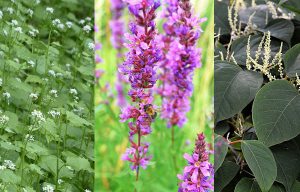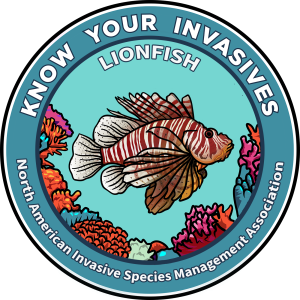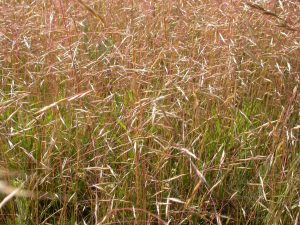Registration numbers soar as invasive species professionals are eager to learn more about this important tool for the management of invasive plants in North America.
We are excited to announce the launch of NAISMA’s newest short course, Biocontrol 101, in our InvasivesU online learning library. This asynchronous course was created to provide the public with an introduction of the science, application, and regulation of classical weed biological control. Registration for this short course is free thanks to funding from the USDA Forest Service.
Classical weed biocontrol is an important, under-utilized tool in the management of invasive plants. After completing this course, students will understand:
- The fundamentals of classical weed biocontrol.
- The science and regulations that guide the practice.
- How to distinguish classical weed biocontrol from other forms of biocontrol.
- How biological control insects are identified, tested, regulated, and approved for release.
- How biological control of weeds can fit into an integrated weed management strategy.
This course was developed by members of the NAISMA Classical Biocontrol Committee (CBC) which strives to be the central hub for collecting, discussing, and sharing on-the-ground successes, failures, observations, and resources in North America. In addition to creating this course, the CBC has also developed weed and biocontrol agent fact sheets to help landowners and weed managers identify and understand weed ecology, as well as learn about the weed biocontrol agents.
“Biological control is a key component of long term sustainable management of invasive species, especially invasive plants,” said Phil Weyl, CBC Committee Member. “We, as biocontrol practitioners, need to promote its use, educate the public on the benefits and get it more widely accepted as a useful and significant tool in the management of invasive species. The CBC is geared at doing just that, with a group of passionate and enthusiastic individuals that I am very grateful to be part of.”
On December 7, NAISMA hosted its 4th annual virtual Biocontrol Summit focused on using weed biocontrol to reduce wildfire risk and mitigate wildfire impacts. The summit communicated the latest in classical weed biocontrol research to North American invasive plant managers and educators and connected researchers to on-the-ground practitioners.
NAISMA is partnering with the USDA Forest Service and the National Association of State Foresters to host the 2024 National Forum for Biological Control meeting in Annapolis, Maryland from March 11-14, 2024. This meeting will focus on both weed and arthropod biocontrol and will be a venue for all biocontrol practitioners, researchers, and policy makers to come together and address the shared challenges and opportunities that exist in this area. Early bird registration for this event closes on January 15th.
InvasivesU is NAISMA’s exclusive online learning library intended to provide professionals, students, and interested individuals with the knowledge and tools necessary to prevent and manage invasive species across North America. We offer online courses and certificates on a variety of different topics. Check out our library today!




